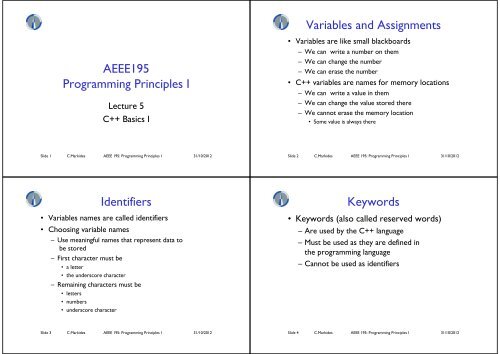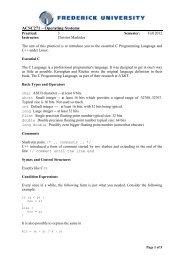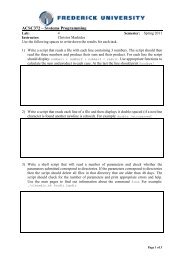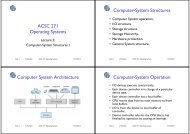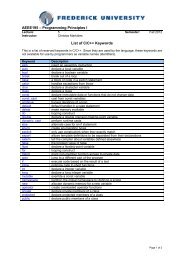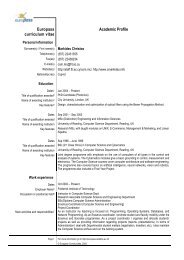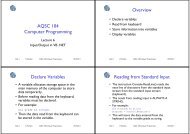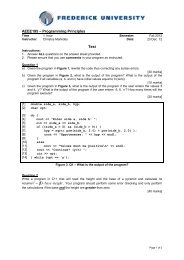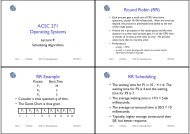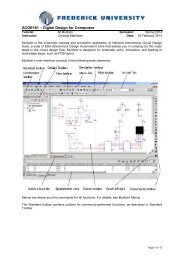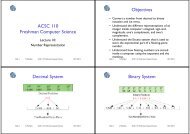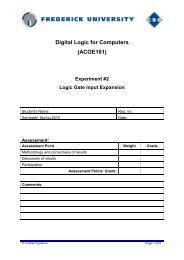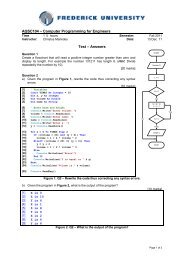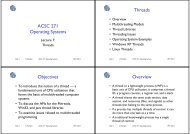Variables and Arithmetic Expressions
Variables and Arithmetic Expressions
Variables and Arithmetic Expressions
You also want an ePaper? Increase the reach of your titles
YUMPU automatically turns print PDFs into web optimized ePapers that Google loves.
<strong>Variables</strong> <strong>and</strong> Assignments<br />
AEEE195<br />
Programming Principles I<br />
Lecture 5<br />
C++ Basics I<br />
• <strong>Variables</strong> are like small blackboards<br />
– We can write a number on them<br />
– We can change the number<br />
– We can erase the number<br />
• C++ variables are names for memory locations<br />
– We can write a value in them<br />
– We can change the value stored there<br />
– We cannot erase the memory location<br />
• Some value is always there<br />
Slide 1 C.Markides AEEE 195: Programming Principles I 31/10/2012<br />
Slide 2 C.Markides AEEE 195: Programming Principles I 31/10/2012<br />
Identifiers<br />
• <strong>Variables</strong> names are called identifiers<br />
• Choosing variable names<br />
– Use meaningful names that represent data to<br />
be stored<br />
– First character must be<br />
• a letter<br />
• the underscore character<br />
– Remaining characters must be<br />
• letters<br />
• numbers<br />
• underscore character<br />
Keywords<br />
• Keywords (also called reserved words)<br />
– Are used by the C++ language<br />
– Must be used as they are defined in<br />
the programming language<br />
– Cannot be used as identifiers<br />
Slide 3 C.Markides AEEE 195: Programming Principles I 31/10/2012<br />
Slide 4 C.Markides AEEE 195: Programming Principles I 31/10/2012
Example<br />
Result<br />
Slide 5 C.Markides AEEE 195: Programming Principles I 31/10/2012<br />
Slide 6 C.Markides AEEE 195: Programming Principles I 31/10/2012<br />
Declaring <strong>Variables</strong> (Part 1)<br />
• Before use, variables must be declared<br />
Declaring <strong>Variables</strong> (Part 2)<br />
• Immediately prior to use<br />
– Tells the compiler the type of data to store<br />
Examples: int number_of_bars;<br />
double one_weight, total_weight;<br />
– int is an abbreviation for integer.<br />
• could store 3, 102, 3211, -456, etc.<br />
• number_of_bars is of type integer<br />
– double represents numbers with a fractional<br />
component<br />
• could store 1.34, 4.0, -345.6, etc.<br />
• one_weight <strong>and</strong> total_weight are both of type double<br />
int main()<br />
{<br />
At the beginning<br />
int sum;<br />
sum = score1 + score 2;<br />
…<br />
return 0;<br />
}<br />
Slide 7 C.Markides AEEE 195: Programming Principles I 31/10/2012<br />
Slide 8 C.Markides AEEE 195: Programming Principles I 31/10/2012
Declaring <strong>Variables</strong> (Part 3)<br />
• Declaration syntax:<br />
– Type_name Variable_1 , Variable_2, . . . ;<br />
• Declaration Examples:<br />
– double average, m_score, total_score;<br />
– double moon_distance;<br />
– int age, num_students;<br />
– int cars_waiting;<br />
Slide 9 C.Markides AEEE 195: Programming Principles I 31/10/2012<br />
Assignment Statements<br />
• An assignment statement changes the value of a<br />
variable<br />
– total_weight = one_weight + number_of_bars;<br />
• total_weight is set to the sum one_weight + number_of_bars<br />
– Assignment statements end with a semi-colon<br />
– The single variable to be changed is always on the left<br />
of the assignment operator ‘=‘<br />
– On the right of the assignment operator can be<br />
• Constants -- age = 21;<br />
• <strong>Variables</strong> -- my_cost = your_cost;<br />
• <strong>Expressions</strong> -- circumference = diameter * 3.14159;<br />
Slide 10 C.Markides AEEE 195: Programming Principles I 31/10/2012<br />
Assignment Statements<br />
<strong>and</strong> Algebra<br />
• The ‘=‘ operator in C++ is not an equal<br />
sign<br />
– The following statement cannot be true in<br />
algebra<br />
• number_of_bars = number_of_bars + 3;<br />
– In C++ it means the new value of<br />
number_of_bars<br />
is the previous value of number_of_bars plus 3<br />
Initializing <strong>Variables</strong><br />
• Declaring a variable does not give it a value<br />
– Giving a variable its first value is initializing the variable<br />
• <strong>Variables</strong> are initialized in assignment statements<br />
double mpg; // declare the variable<br />
mpg = 26.3; // initialize the variable<br />
• Declaration <strong>and</strong> initialization can be combined<br />
using two methods<br />
– Method 1<br />
double mpg = 26.3, area = 0.0 , volume;<br />
– Method 2<br />
double mpg(26.3), area(0.0), volume;<br />
Slide 11 C.Markides AEEE 195: Programming Principles I 31/10/2012<br />
Slide 12 C.Markides AEEE 195: Programming Principles I 31/10/2012
Input <strong>and</strong> Output<br />
• A data stream is a sequence of data<br />
– Typically in the form of characters or numbers<br />
• An input stream is data for the program to use<br />
– Typically originates<br />
• at the keyboard<br />
• at a file<br />
• An output stream is the program’s output<br />
– Destination is typically<br />
• the monitor<br />
• a file<br />
Output using cout<br />
• cout is an output stream sending data to the<br />
monitor<br />
• The insertion operator "
Examples Using cout<br />
• Another way of performing addition is to<br />
use a variable:<br />
#include <br />
using namespace std;<br />
int main()<br />
{<br />
/* Declare variables here */<br />
int result;<br />
result = 5 + 6;<br />
cout
Formatting Real Numbers<br />
• Real numbers (type double) produce a variety of<br />
outputs<br />
double price = 78.5;<br />
cout
Input Using cin<br />
• cin is an input stream bringing data from the keyboard<br />
• The extraction operator (>>) removes data to be used<br />
• Example:<br />
cout number_of_bars;<br />
cin >> one_weight;<br />
• This code prompts the user to enter data then<br />
reads two data items from cin<br />
– The first value read is stored in number_of_bars<br />
– The second value read is stored in one_weight<br />
– Data is separated by spaces when entered<br />
Reading Data From cin<br />
• Multiple data items are separated by spaces<br />
• Data is not read until the enter key is pressed<br />
– Allows user to make corrections<br />
• Example:<br />
cin >> v1 >> v2 >> v3;<br />
– Requires three space separated values<br />
– User might type<br />
34 45 12 <br />
Slide 25 C.Markides AEEE 195: Programming Principles I 31/10/2012<br />
Slide 26 C.Markides AEEE 195: Programming Principles I 31/10/2012<br />
Designing Input <strong>and</strong> Output<br />
• Prompt the user for input that is desired<br />
– cout statements provide instructions<br />
cout > age;<br />
• Notice the absence of a new line before using cin<br />
• Echo the input by displaying what was read<br />
– Gives the user a chance to verify data<br />
cout
• Can you<br />
Conclusions (2/4)<br />
– write an input statement to place a<br />
value in the variable the_number?<br />
– Write the output statement to prompt for<br />
the value to store in the_number?<br />
– Write an output statement that produces a<br />
newline?<br />
– Format output of rational numbers to show<br />
4 decimal places?<br />
Conclusions (3/4)<br />
• Can you<br />
– Declare <strong>and</strong> initialize two integers variables to zero?<br />
The variables are named feet <strong>and</strong> inches.<br />
– Declare <strong>and</strong> initialize two variables, one int <strong>and</strong> one<br />
double?<br />
Both should be initialized to the appropriate form of 5.<br />
– Give good variable names for identifiers to store<br />
• the speed of an automobile?<br />
• an hourly pay rate?<br />
• the highest score on an exam?<br />
Slide 29 C.Markides AEEE 195: Programming Principles I 31/10/2012<br />
Slide 30 C.Markides AEEE 195: Programming Principles I 31/10/2012


